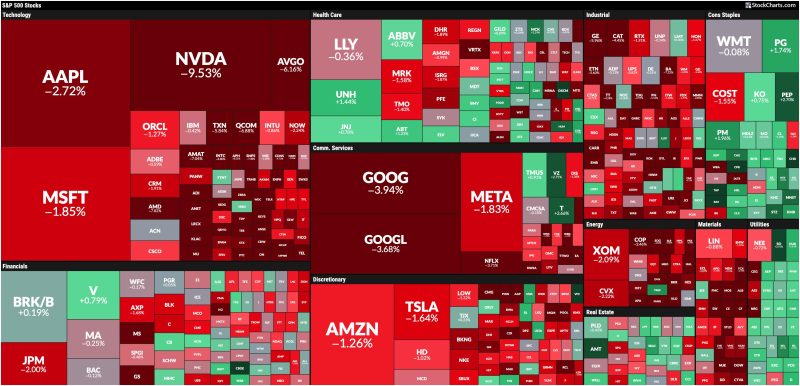In today’s stock market, the technology sector is witnessing a significant downturn as mega-cap stocks face substantial profit-taking. This market movement has left investors and analysts closely monitoring the ongoing trends and re-evaluating their investment strategies to navigate through the volatility.
The recent sell-off in the tech sector has raised concerns among market participants as big tech companies face downward pressure on their stock prices. Companies like Apple, Amazon, Microsoft, and Alphabet have all experienced a decline in their share prices due to profit-taking by investors. This has triggered a broader selloff in the sector, impacting the overall market sentiment.
The heightened profit-taking is a reflection of investors cashing in on the gains they have made in tech stocks over the past months. The surge in tech stock prices fueled by the pandemic-induced remote work and increased digitalization has created an attractive opportunity for investors to realize their profits. As a result, many investors are selling off their tech holdings, leading to a downward trend in the sector.
Moreover, the recent market dynamics have highlighted the importance of diversification for investors to mitigate risks during periods of heightened volatility. While tech stocks have been the frontrunners in the market rally, the current sell-off underscores the need for a balanced portfolio that includes exposure to different sectors and asset classes.
Additionally, the profit-taking in the tech sector has also raised concerns about the sustainability of the recent market rally. Investors are closely watching the developments in the market to gauge whether this downturn is a temporary correction or a signal of a broader market shift. The uncertainty surrounding economic recovery, inflation, and interest rates further adds to the already complex market dynamics, creating a challenging environment for investors.
In response to the tech sell-off, some investors are considering alternative investment strategies, such as shifting their focus to value stocks or defensive sectors that are less susceptible to market fluctuations. By diversifying their portfolios and re-evaluating their investment thesis, investors can better position themselves to weather the current market uncertainty and potential downturns.
In conclusion, the recent profit-taking in the tech sector has sent ripples through the stock market, prompting investors to reassess their investment strategies and portfolio allocations. While the current market volatility poses challenges, it also presents opportunities for investors to recalibrate their positions and make informed decisions to navigate through the uncertainty. By staying informed, remaining disciplined, and adapting to changing market conditions, investors can better navigate the ever-evolving landscape of the stock market.


































